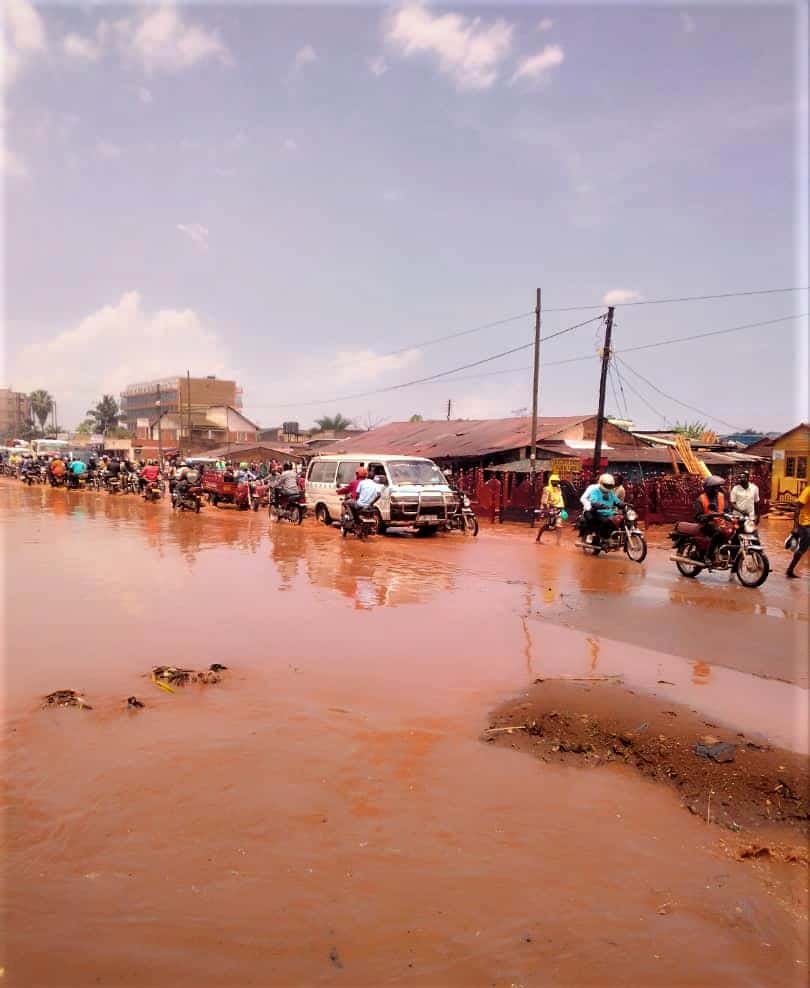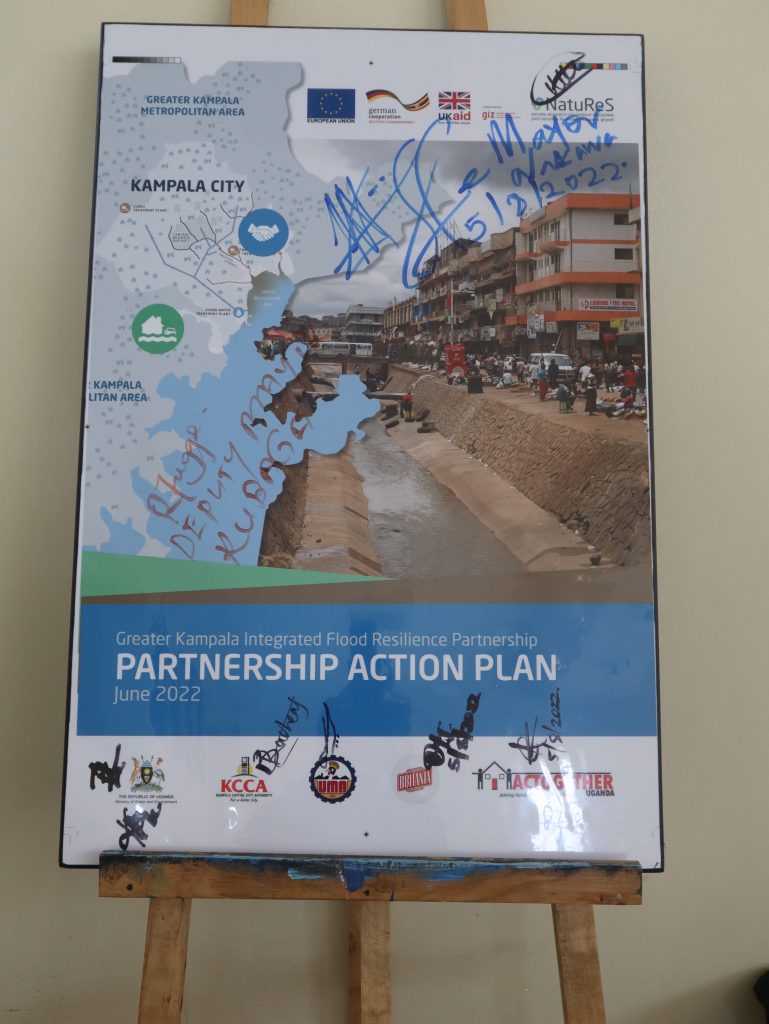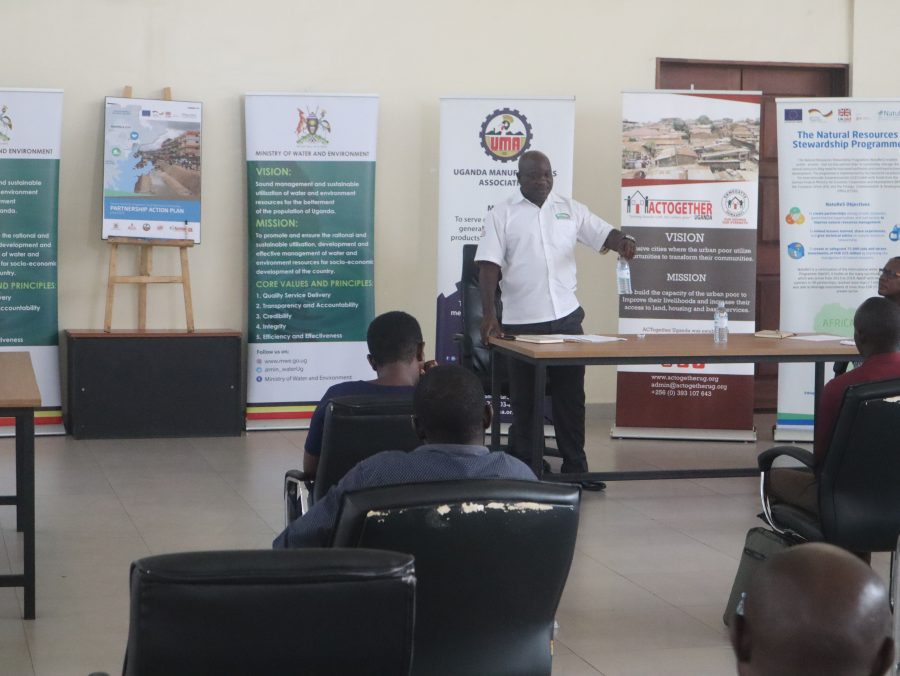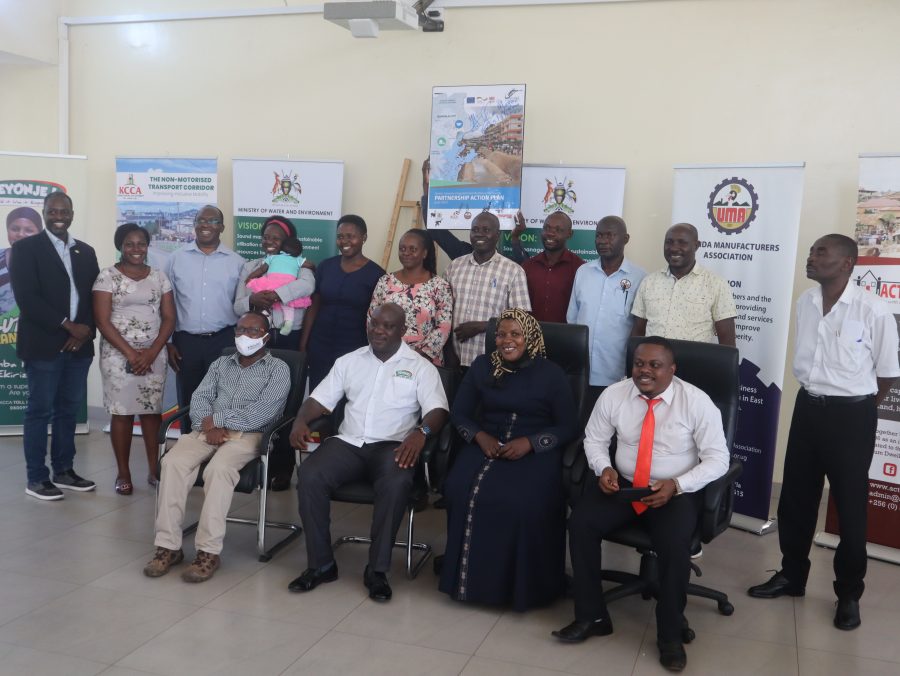Official Launch of the Greater Kampala Integrated Flood Resilience Partnership Action Plan
Kampala City, Uganda’s capital and commercial centre, is home to about 70% of the country’s small, medium and large manufacturing businesses and accounts for nearly half of Uganda’s 40 billion USD total Gross Domestic Product (World Bank,2021). The rapid urbanization of the Greater Kampala Metropolitan Area (GKMA) has led to increased impervious surfaces in ecologically sensitive areas such as steep slopes, wetlands and flood plains relevant for flood control, resulting in accelerated and often devastating runoff of water. The city’s existing drainage system, which was designed for a much smaller and less densely built city, is quite old and poorly managed and can no longer cope with the runoff from the rapidly expanding built-up areas.
The situation is further exacerbated by frequent clogging of the drainage system with solid waste, often originating from the city’s informal settlements. All of this increases the likelihood of flooding of critical areas such as road crossings, industrial areas, business premises and residential suburbs in the low-lying informal settlements. Of major concern is the wide-spread nature of the flooding and the increasing frequency of more intense flooding events, also attributed to climate change. Efforts to address the flooding challenge are limited in scope and often constrained, among others, by the city`s insufficient financial resources. However, also the lack of cooperation between stakeholders represents a hurdle to implementing effective solutions.

Addressing the flooding challenge in Kampala requires a multi-sectoral approach, involving all stakeholders (public, private actors and communities) to work collaboratively to develop and implement integrated flood risk management solutions which are scalable and context specific.
It’s against this background that partners from all sectors started to collaborate under the Greater Kampala Integrated Flood Resilience Partnership. The partnership`s objective is to improve urban resilience to flooding, thereby enhancing socio-economic development in Greater Kampala. Partners therefore jointly promote investments in nature-based “blue-green infrastructure” such as regreening of drainage channels, bioswales and retention ponds, as well as further inclusive solutions, in priority hot-spot areas. This way, they want to showcase the effectiveness of natural flood protection mechanisms in mitigating flooding, thereby protecting livelihoods and businesses` basis of operations, contributing to sustained socio-economic development. Partners also aim at developing innovative ways of using human-engineered “grey” infrastructure for better flood control.
The partnership follows the Natural Resources Risk and Action Framework (NRAF). The NRAF is a holistic approach developed by NatuReS to tackle shared natural resources risks in a participative manner. It guides initiation and implementation of natural resources stewardship partnerships through a series of tailored tools.
Together, partners developed a comprehensive Partnership Action Plan (PAP). The PAP is a commitment by all partners to support the implementation of jointly agreed activities. These activities include:
- Developing strategies for the integration of blue-green infrastructure solutions, creating an evidence base for their effectiveness in mitigating flooding
- Promoting investment and piloting of “blue-green” infrastructure and innovative “grey” solutions for flood resilience in selected catchments
- Fostering behavioral change and stakeholder empowerment in the development of flood mitigation solutions
- Encouraging rainwater harvesting within the private sector
Partnership Action Plan Launch

The PAP was formally launched during a ceremony at the Ministry of Water and Environment on the 5th of August 2022. His Worship Paul Mugambe, the Mayor of Kampala`s Nakawa Division, presided over the ceremony as a guest of honour.He congratulated partners for their foresightedness in establishing the partnership to jointly find solutions for the recurring flash floods in Greater Kampala. Often, they are caused by an insufficient, dilapidated and poorly managed drainage systems, combined with poor solid waste management, particularly of plastic waste, resulting in clogged drainage channels. The mayor underlined that, as part of the City’s Development Master Plan, strengthening the city’s resilience to climate change through the implementation of sustainable measures has been set as a priority by Kampala Capital City Authority.

The partnership chairperson, Dr. Benon Zaake, the Commissioner for Water Resources Monitoring and Assessment at the Ministry of Water and Environment, highlighted that rapid urbanization coupled with improper solid waste management in the GKMA has exacerbated the flooding problem to the extent that the existing drainage systems can no longer cope with the situation. He commended partners for prioritizing the integration of blue-green infrastructure solutions into Kampala’s flood management strategies. Moreover, he reaffirmed the Ministry`s commitment to the partnership and urged all partners to dedicate their agreed time and resources towards ensuring successful implementation of the PAP.

Other high officials included the Deputy Mayor of Rubaga Division, Ms. Rehema Fugge, and the Executive Secretary for Public Health and Social Services for Rubaga division, Mr. Emmanuel Kizza. They both expressed their gratitude towards the partnership and the important role it is playing in jointly working towards a flood resilient Greater Kampala.

Copyright: GIZ/Ebong Willy Bunga
Following the successful launch of the PAP, partners now move into the next phase (“Act”), focusing on accelerated implementation of agreed activities.
For more information on the Greater Kampala Integrated Flood Resilience Partnership, check here: Greater Kampala Integrated Flood Resilience Partnership and download the factsheet. Also, follow us on Twitter to stay up to date with the latest news.